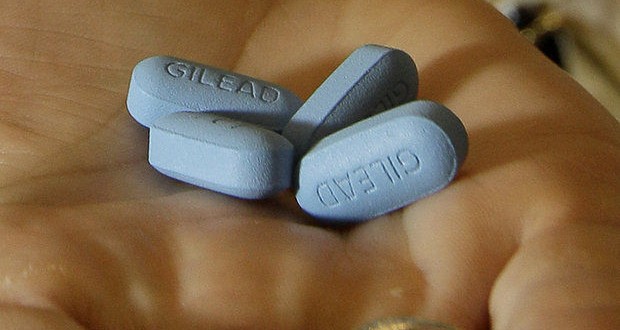Scientists trialling the prophylactic drug Truvada say it could cut the risk of infection between gay men by as much as 86%.
The PROUD study, carried out by MRC CTU at UCL and Public Health England, aimed to find whether prescribing PrEP to men who have sex with men would lower their risk of becoming infected with HIV.
The 86% protection rate found with daily usage of PrEP (Truvada) is the highest ever seen in a randomized study with the drug.
Although there are some concerns that PrEP could see a drop in the use of condoms among high risk groups, preliminary data from the study has shown that condom usage among participants remained about the same both before and during the trial.
Deborah Gold, chief executive of NAT (National AIDS Trust) told Gay Star News: ‘The study shows two important things – one, that PrEP is highly effective in preventing HIV and two, that gay men won’t just throw away the condoms as soon as they start taking PrEP (STIs were the same in men taking and not taking PrEP).’
She continued: ‘During the study period there were 19 HIV infections in the group not taking PrEP. If we can stop people getting HIV by giving them PrEP, we have an ethical duty to do so.
‘Furthermore, over the course of their lifetime the treatment of those 19 men will cost the NHS nearly £7 million. So the financial argument is clear, as is the ethical one. PrEP needs to be available on the NHS as soon as possible for all those who need it.’
Launched back in 2012, the study featured 545 participants at 13 different sexual health clinics in the UK. A total of 276 participants received PrEP immediately, while 269 began taking the drug after a period of 12 months, which allowed the researchers to compare the groups.
After seeing overwhelmingly promising results, researchers went on to provide the drug to the 269 participants ahead of schedule back in October 2014.
‘PrEP is, quite simply, a game-changer. We know that most gay men use condoms most of the time, and that this has prevented tens of thousands of HIV infections since the epidemic began in the UK,’ said Dr Michael Brady, Medical Director at Terrence Higgins Trust.
He continued: ‘However, we also know that condomless sex vastly increases the risk of HIV being transmitted. This research shows just how effective PrEP can be in preventing transmission of the virus in groups at greatest risk; offering another line of defense alongside condoms and regular testing.
‘We urge the Government, NHS England and Local Authorities to make PrEP a key priority in the fight against HIV.’
Sheena McCormack, Professor of Clinical Epidemiology at the MRC Clinical Trials Unit at UCL, and Chief Investigator of the PROUD study, said: ‘These results are extremely exciting and show PrEP is highly effective at preventing HIV infection in the real world.’
‘Concerns that PrEP would not work so well in the real world were unfounded. These results show there is a need for PrEP, and offer hope of reversing the epidemic among men who have sex with men in this country,’ she added.
It is estimated that nearly 100,000 people in the UK are currently living with HIV, with a fifth of those believed to be undiagnosed. In July 2014, the World Health Organization caused controversy when they suggested every single sexually active gay and bisexual man should be on drugs to prevent HIV.
The United States, which offers Truvada for around $13,000 a year but is covered by most health insurance plans, has had a low take-up rate among HIV negative men since it first became available over two years ago.
Agencies/Canadajournal
 Canada Journal – News of the World Articles and videos to bring you the biggest Canadian news stories from across the country every day
Canada Journal – News of the World Articles and videos to bring you the biggest Canadian news stories from across the country every day



